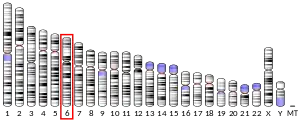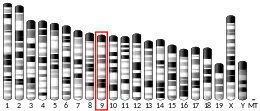LCA5
Lebercilin, also known as leber congenital amaurosis 5 (LCA5), is a protein that in humans is encoded by the LCA5 gene.[5][6][7] This protein is thought to be involved in centrosomal or ciliary functions.
| LCA5 | |||||||||||||||||||||||||||||||||||||||||||||||||||
|---|---|---|---|---|---|---|---|---|---|---|---|---|---|---|---|---|---|---|---|---|---|---|---|---|---|---|---|---|---|---|---|---|---|---|---|---|---|---|---|---|---|---|---|---|---|---|---|---|---|---|---|
| Identifiers | |||||||||||||||||||||||||||||||||||||||||||||||||||
| Aliases | LCA5, C6orf152, Leber congenital amaurosis 5, lebercilin, lebercilin LCA5 | ||||||||||||||||||||||||||||||||||||||||||||||||||
| External IDs | OMIM: 611408 MGI: 1923032 HomoloGene: 32718 GeneCards: LCA5 | ||||||||||||||||||||||||||||||||||||||||||||||||||
| |||||||||||||||||||||||||||||||||||||||||||||||||||
| |||||||||||||||||||||||||||||||||||||||||||||||||||
| |||||||||||||||||||||||||||||||||||||||||||||||||||
| |||||||||||||||||||||||||||||||||||||||||||||||||||
| |||||||||||||||||||||||||||||||||||||||||||||||||||
| Wikidata | |||||||||||||||||||||||||||||||||||||||||||||||||||
| |||||||||||||||||||||||||||||||||||||||||||||||||||
Clinical significance
Mutations in the LCA5 gene are associated with Leber's congenital amaurosis.
References
- GRCh38: Ensembl release 89: ENSG00000135338 - Ensembl, May 2017
- GRCm38: Ensembl release 89: ENSMUSG00000032258 - Ensembl, May 2017
- "Human PubMed Reference:". National Center for Biotechnology Information, U.S. National Library of Medicine.
- "Mouse PubMed Reference:". National Center for Biotechnology Information, U.S. National Library of Medicine.
- "Entrez Gene: Leber congenital amaurosis 5".
- Dharmaraj S, Li Y, Robitaille JM, Silva E, Zhu D, Mitchell TN, Maltby LP, Baffoe-Bonnie AB, Maumenee IH (January 2000). "A novel locus for Leber congenital amaurosis maps to chromosome 6q". Am. J. Hum. Genet. 66 (1): 319–26. doi:10.1086/302719. PMC 1288337. PMID 10631161.
- den Hollander AI, Koenekoop RK, Mohamed MD, Arts HH, Boldt K, Towns KV, Sedmak T, Beer M, Nagel-Wolfrum K, McKibbin M, Dharmaraj S, Lopez I, Ivings L, Williams GA, Springell K, Woods CG, Jafri H, Rashid Y, Strom TM, van der Zwaag B, Gosens I, Kersten FF, van Wijk E, Veltman JA, Zonneveld MN, van Beersum SE, Maumenee IH, Wolfrum U, Cheetham ME, Ueffing M, Cremers FP, Inglehearn CF, Roepman R (July 2007). "Mutations in LCA5, encoding the ciliary protein lebercilin, cause Leber congenital amaurosis". Nat. Genet. 39 (7): 889–95. doi:10.1038/ng2066. PMID 17546029. S2CID 13772221.
This article is issued from Wikipedia. The text is licensed under Creative Commons - Attribution - Sharealike. Additional terms may apply for the media files.



